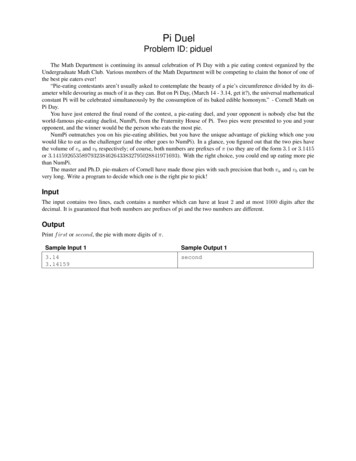
Transcription
TAMING THE DRAGONGerard Manley Hopkins and The Wreck of the DeutschlandVincent Di StefanoI first came under the spell of Hopkins' The Windhover when I was in my late forties.It was an unforgettable entry point into the nuanced yet paradoxically razor-sharpmind of the priest-poet Gerard Manley Hopkins. I knew immediately that it was a bigpoem but was strangely challenged by the elusiveness of its meaning.This was one of my first lessons in the apprehension - the grasping, the holding - ofthe quicksilver language that slipped from phrase to phrase, from image to image,from sound to sound with a current-like fluidity throughout the poem. As I becamemore acquainted with it, I found myself carried through sonic textures that graduallyyielded their meaning. The spoken poem would often leave faint onomatopoeic tracesof Hopkins' intent in the wake of each successive voicing. I began to understand justwhat Hopkins meant when he once wrote to his friend and fellow poet RobertBridges: "My verse is less to be read than to be heard, as I have told you before." In alater communication about The Wreck of the Deutschland, he reiterated: "Take breathand read it with the ears, as I always wish to be read, and my verse becomes all right."Even so, Hopkins' work remains difficult and calls for - demands rather - commitmentand active engagement. I early learned the truth that Enda McDonagh once voiced: "AHopkins poem will often take many readings and many listenings."Some years later, I took up The Wreck of the Deutschland and read it through in asingle sitting. The fascination and perplexity that I had earlier experienced with TheWindhover were entirely dwarfed by this new poem. I understood clearly that it wasabout far more than the wrecking of a German ship at the mouth of the Thames inearly December 1875. But even after several re-readings, I was still grappling with thethemes that symphonically arose and subsided throughout the poem. I was, however,entranced. The poem held a magisterial quality that was infused throughout by acontinuous searching for, a constant chasing of the words that would sufficientlywww.thehealingproject.net.auDante’s Ghost/Gerard Manley Hopkins/The Wreck of the Deutschland1
voice the barely graspable intensity of Hopkins' intention and the depth of his livedexperience.Early in the poem, Hopkins declares:I kiss my handTo the stars, lovely-asunderStarlight, wafting him out of it; andGlow, glory in thunder. . . .This is no lightly-voiced dramatic flourish, but expresses Hopkins' near-daemonicpitch of experience and his determination to poetically transmit the nature of thatexperience. Regarding The Wreck of the Deutschland, Hopkins remarked to RobertBridges: "What refers to myself in the poem is all strictly and literally true and didoccur; nothing is added for poetical padding." We begin to get some sense of the lifeworld inhabited by Hopkins.As with The Windhover, it would eventually take many voicings on my part to discernand to gradually explicate the wondrously infolded spiritual and emotional worldsinhabited by the young Gerard Manley Hopkins during the final years of his Jesuittraining, the time when this quietly explosive poem irrupted out of the self-imposedseven year period of literary silence that Hopkins had maintained since entering thenovitiate.No Artist Arises in IsolationTrue art requires fertile soil. Hopkins' language, sensitivity, philosophical depth andcreative independence all emerged from a childhood lived within a rich culturalmilieu. His Anglican parents were highly literate and their library held books inItalian, German and French in addition to English titles. Painting and music wereintegral to Hopkins' family culture. By the time he had completed his secondaryeducation, his knowledge of literature, poetry, theology and history wasencyclopaedic.His father was an accomplished man of the world who served as British consulgeneral for the Hawaiian Islands. His mother, from whom he is said to have inheritedboth sensitivity and deep spirituality, devoted her own energies to the raising of theeight Hopkins children of whom Gerard was the eldest.Like Simone Weil after him, Hopkins appears to have been born with a less-thanrobust physical constitution but with a strong ascetic disposition conjoined to apowerful intellect. To his mother's great distress, he would often undertake prolongedfasts during his adolescent years. She eventually found it necessary to forbid suchpractises out of concern for his health. Hopkins' scholar W. H. Gardner relates thefollowing anecdote drawn from his time at Highgate Grammar school: "Observingthat nearly all the people around him 'consumed more liquids than was good forthem', he resolved to prove his theory by drinking nothing for a week. The result wasthat he collapsed at drill. But when this feat of abstinence was doubted by a master, aschoolfellow exclaimed: 'He tell a lie? Why, he would sooner die.' So early appearedthat moral scrupulosity which played so large a part in his attitude to life and poetry."www.thehealingproject.net.auDante’s Ghost/Gerard Manley Hopkins/The Wreck of the Deutschland2
Hopkins' poetic abilities were highly developed even as a young man. He twice wonthe school poetry prize while at Highgate, the first when he was 16, the second whenhe was 18 years old. He went on to win a scholarship to study Classics at BalliolCollege Oxford and thereby entered the second major formative period of his life.Among GiantsHopkins was a natural scholar and fully absorbed the intellectual nourishment thatwas so abundant at Oxford. His later writings reveal that he was fully familiar withthe works of Shakespeare, Milton, Wordsworth and Keats. He also followed thewritings of more contemporary poets such as Christina Rossetti (with whom he hadmet while at Oxford), Alfred Lord Tennyson, Matthew Arnold, Algernon CharlesSwinburne, and Walt Whitman. Hopkins did not simply read their poems but soughtto understand the nature of the poets themselves. His appreciation of the worth of anartist rested as much in the way they lived their lives as in their technical and creativemastery. He acknowledged a deep sympathy with the unique style of the proud andtumescent Walt Whitman even though he had read but few of his poems, but went onto politely refer to him as a "very great scoundrel." And of the decadent aestheteSwinburne, the young Hopkins wrote: "It is impossible not personally to form anopinion against the morality of a writer like Swinburne." Ten years later, he was todescribe Swinburne as "a plague of mankind" even while conceding the man'soccasional genius.Hopkins made a number of life-long connections while at Oxford. It was here that hemet Robert Bridges, the future poet laureate who became a close confidant and gently(and sometimes not-so-gently) combative critic of his poems. While at Oxford, hesecured a copy of Richard Dixon's Christ's Company, a poetic exploration of the livesand thoughts of those - including Mary Magdalene - who were part of the inner circleof Jesus during his earthly ministry. Dixon was already known to Hopkins as he hadtaught poetry at Highgate while Hopkins was a student there. They maintained astrong correspondence that continued until the time of Hopkins' death at the age of 44years in 1889. The letters written by Hopkins to Bridges and Dixon remain a treasurehouse that reveals the powerful currents of both doubt and of certainty that carriedHopkins through his life as poet and priest.Beyond familiarising himself with the works of fellow poets and of the poetictraditions, Hopkins also began to examine the essential foundations of his own lifewhile at Oxford. In 1866, at the age of 22, Hopkins eschewed his high Anglicanaffiliations and was baptised into the Catholic church. Two years later, he gatheredtogether all of his earlier writings and consigned them to the flames. He then beganhis training for the Jesuit priesthood. Soon after being ordained ten years later, hewrote to Richard Dixon: "What [verse] I had written I burnt before I became a Jesuitand resolved to write no more, as not belonging to my profession, unless it were thewish of my superiors."In December 1875, seven years into his training, Hopkins was profoundly moved onlearning of the death by drowning of five Franciscan nuns when the German transAtlantic steamer The Deutschland foundered on a sand bank at the head of theThames during a severe snow storm. In his letter to Dixon, he continued: "But whenin the winter of '75 the Deutschland was wrecked in the mouth of the Thames and fivewww.thehealingproject.net.auDante’s Ghost/Gerard Manley Hopkins/The Wreck of the Deutschland3
Franciscan nuns, exiles from Germany by the Falck Laws, aboard of her weredrowned, I was affected by the account and happening to say so to my rector he saidthat he wished someone would write a poem on the subject. On this hint, I set to workand, though my hand was out at first, produced one."The poem that Gerard Manley Hopkins produced remains one of the most searchingexplorations of the notion of Divine presence in a world riven by human desire andhuman tragedy that has ever been penned.Entering the GateIn order to understand the revolutionary nature of Hopkins' poem, it is helpful to havesome sense of the poetic milieu within which he found himself and to know a little ofhis own relationship to the poetic structures of his time. Even before he enteredOxford, Hopkins was deeply familiar with the poetic tradition as it had developed inEngland. He was strongly attracted to the works of Milton and often mentioned him inhis later communications. He was also familiar with the less structured work of theRomantic poetics and was conversant with the different currents that flowed throughthe poetry of the Victorian era.His seven years of intense interior work as a Jesuit priest-in-training and his consciousdecision to totally eschew the pursuit of poetic expression during that time gave himan unusual independence and freedom. He was not part of any poetic circle, yetinhabited a world of intense poetic sensibility. He had a fascination with language andthe deeper layers of expression that lay hidden in colloquial forms of engagement inspoken English, a language that had historically been shaped by numerous influencesfrom its early Celtic roots and many dialects, by contact with the Romans, and laterby Nordic and French infusions. His highly individuated understanding of languagewas projected in its fullness in The Wreck of the Deutschland. It also charged theentire canon of his poems that eventually saw the light of day after Robert Bridgespublished his works 30 years after Hopkins' death.Hopkins made a conscious choice to break away from the constraint of the strictmetrical forms that characterised the work of many of the early poets he had studiedand that were sustained in the work of such contemporaries as Swinburne, Tennyson,Arnold, Bridges and others. The Wreck of the Deutschland introduces what was tobecome the signatory form that carried much of the energy within Hopkins' poems sprung rhythm. Through the use of sprung rhythm, he effectively fractured the formaland metronomic rhythmic structures that gave drive and coherence to the betterknown poems of his time. Yet remarkably, this was done within a highly-disciplinedpattern of rhyming sequences. Consider the first stanza:Thou mastering meGod! giver of breath and bread;World's strand, sway of the sea;Lord of living and dead;Though has bound bones and veins in me, fastened me flesh,And after it almost unmade, what with dread,Thy doing: and dost thou touch me afresh?Over again I feel thy finger and find thee.www.thehealingproject.net.auDante’s Ghost/Gerard Manley Hopkins/The Wreck of the Deutschland4
A quick structural analysis reveals external rhyming in the 1st, 3rd and 8th lines, inthe 2nd, 4th and 6th lines, and in the 5th and 7th lines. This ab ab cb ca pattern isconsistently reproduced throughout all 35 stanzas of the poem. This accomplishmentis as exacting as Dante's use of the terza rima sequence throughout the entirety of TheDivine Comedy. But unlike Dante or Spenser or his contemporary Swinburne,Hopkins' rhyming pattern effectively vanishes in the voicing of the poem where theplacing of syllabic emphasis or stress is more conversational or dramatic. Comparethis with the first stanza of the chorus from Swinburne's Atalanta in Calydonpublished at the time Hopkins was a student at Oxford:Before the beginning of yearsThere came to the making of manTime, with a gift of tears;Grief, with a glass that ran;Pleasure, with pain for leaven;Summer, with flowers that fell;Remembrance, fallen from heaven,And madness risen from hell;Strength without hands to smite;Love that endures for a breath;Night, the shadow of light,And life, the shadow of death.The rhyming sequence here is straightforward while the alliterative pounding ofconsonants and the string of assonances in virtually every line all serve to reinforcethe strong iambic metre of the stanza. Hopkins' drive comes from another source. Hisassonant and alliterative elements will often determine the variable rhythmic sequenceof stresses: Thou has bound bones and veins in me, fastened me flesh. The poem isthereby given a near-conversational fluidity that effectively carries one through thedensity of Hopkins' language and the intensity of his images and ideas.Yet the poem is no romp. It can be hard going at times, but is a labour that yieldsever-renewing spiritual and experiential riches with each pass. Describing the poemfor his friend and mentor Richard Dixon, Hopkins wrote: "It needs study and isobscure . . . . I was not desirous that the meaning of all be quite clear, at leastunmistakeable . . . . without the effort that to make it all out would seem to haverequired." He continued: "What seems at first sight meaningless will yield up its sensewhen one brings it the requisite background and analytic study."Little wonder then that Bridges referred to the poem as: "a great dragon folded in thegate to forbid all entrance." In its essence, The Wreck of the Deutschland is as muchan exquisite explication of mystical, theological and existential thought as it is one ofthe most enigmatically wrought poetic pieces in the English language.Feeling the Dragon's BreathThough the poem is nominally about the wrecking of a ship at the mouth of theThames, it encompasses virtually all of the concerns that tested the sharp and testingmind of the young Hopkins during his final years of Jesuit training.www.thehealingproject.net.auDante’s Ghost/Gerard Manley Hopkins/The Wreck of the Deutschland5
The Wreck of the Deutschland is written in two parts, Part I comprising the first 10stanzas, and Part II the remaining 25 stanzas. The story of the Deutschland and her illfated passengers does not begin until stanza 12:On Saturday sailed from Bremen,American-outward-bound,Take settler and seamen, tell men with women,Two hundred souls in the round. . . .Part I of the poem centres more on the person of Gerard Manley Hopkins than on thewrecking of the Deutschland. Within a short few stanzas, Hopkins reveals histransformation from a young man of high passion questing for meaning, into a fullycommitted Christocentric soul of high degree. From the outset, Hopkins alludes to hisown near-wreckage long before the Deutschland foundered on the combs of a smotherof sand at the mouth of the Thames:Thou hast bound bones and veins in me, fastened me flesh,And after it almost unmade, what with dread,Thy doing: and dost thou touch me afresh?Over again I feel thy finger and find thee.Hopkins here acknowledges that he is not a self-created entity, but one of the manymanifestations of the giver of breath and bread who has been somehow touched byhis maker and rescued from an uncertain fate in a dissolute world. Having beentouched by the finger of God, he is shown the way that he must thereafter travel.He then speaks of the forces that moved him to abandon the faith of his birth (much tohis parents' distress) and be received into the Catholic faith. His conversion was socomplete that within two years, Hopkins had entered the most demanding ofpriesthoods - the Society of Jesus, the Jesuits. He offers a glimpse of the intensity ofemotion that preceded his decision:I did say yesO at lightning and lashed rod;Thou heardst me truer than tongue confessThy terror, O Christ, O God.Hopkins hereby affirms the degree of his commitment through images of the mostpowerful forces in nature and aligns that commitment to that of Jesus in Gethsemaneas he prepared himself to be led into the passion of his crucifixion. Despite hismystical disposition, the experience of terror and horror never entirely left Hopkins.Ten years after penning The Wreck of the Deutschland, he was to write:O the mind, mind has mountains; cliffs of fallFrightful, sheer, no-man-fathomed. Hold them cheapMay who ne'er hung there.Hopkins continues:Thou knowest the walls, altar, and hour and night;The swoon of a heart that the sweep and the hurl of thee trodHard down with a horror of height:And the midriff astrain with leaning of, laced with fire of stress.www.thehealingproject.net.auDante’s Ghost/Gerard Manley Hopkins/The Wreck of the Deutschland6
Was this a confessional remembrance of the time immediately prior to his conversion,when this powerful but sensitive intelligence was contending with the anarchiclibertinism espoused by most of his poetic contemporaries? Was his asceticdisposition contending with the swoons of his own heart in such a milieu? Hopkinsmay have experienced the sweep and the hurl of God as a crushing trod-hard-downforce that could shake him from the heights of faith. And while the Victorian womenof the time were tightly lacing corsets around their constrained midriff, Hopkins gavevoice to the testing of his own libidinous energies when he wrote of the fire of stressthat tightened his own strained midriff.The third stanza describes the next movement, his radical flight to the heart of theHost:The frown of his faceBefore me, the hurtle of hellBehind, where, where was a, where was a place?I whirled out wings that spellAnd fled with a fling of the heart to the heart of the Host.My heart . . . .The frown can be a sign of displeasure. It can also be a sign of expectation. Hopkinswas being drawn by a will greater than his own, one that would place the hurtle ofhell behind him, that would free him from the relentless hound intent on devouringthe time into which he had been hurled. His inner agitation and the urgency, thenecessity of finding refuge find graphic expression as he asks, where, where was a,where was a place? The poet then whirls out wings that spell, the angelic wings that,through voiced poetic forms, could lift him above the tumult that he felt in danger ofbeing engulfed by, and simultaneously, the voiced spell that binds intention andsummons powerful forces to do their work as he fled with a fling to the heart to theheart of the Host. Hopkins here voices from the depths of his being, from the heartthat infuses the whole poem, his complete commitment to reaching the depths ofJesus made manifest through the Eucharistic sacrament. And the heart of Jesus is notother than his own heart - My heart.Hopkins fully accepted that such a mystical assimilation was not only possible, butfully in keeping with the traditional understanding of Christian mystics from the timethat Saint Paul uttered the unforgettable words, "It is no longer I who live, but Christwho lives in me." Hopkins reaffirms this acceptance in the final stanza of the poemwhen he declares: Let him easter in us, be a dayspring to the dimness of us, acrimson-cresseted east. . .This search for mystical union was to carry him throughout his whole life. It foundexquisite rendering in a later poem, That Nature is a Heraclitean Fire where Hopkinsexclaims:I am all at once what Christ is, since he was what I am, andThis Jack, joke, poor potsherd, patch, matchwood, immortal diamondIs immortal diamond.His individuated theology is further elaborated in the remaining stanzas of Part I.Hopkins will have no part in the liberal secularism that dominated e’s Ghost/Gerard Manley Hopkins/The Wreck of the Deutschland7
thought in the middle and latter decades of the 19th century. He affirms both hisposition and his commitment:Be adored among men,God, three-numbered form:Wring thy rebel, dogged in den,Man's malice, with wrecking and storm. . . .The first two lines extend the sentiment voiced in the Lord's Prayer, "hallowed be thyname" to encompass the triune nature of the divinity - Father, Son and Holy Spirit.Man's malice is the rebel, dogged in den, the animal within that brings on wreckingand storm, be it physical or psychological.In the final stanza of Part I, Hopkins calls upon historical precedent both to exemplifyand to amplify the revolutionary nature of true conversion:With an anvil-dingAnd with fire in him forge thy willOr rather, rather then, stealing as SpringThrough him, melt him but master him still:Whether at once, as once at a crash Paul,Or as Austin, a lingering-out sweet skill,Make mercy in all of us, out of us allMastery, but be adored, but be adored King.Hopkins here moves between fire and ice, between the tempering of the soul on firewith an anvil-ding - the energetic ring and the illuminative spray of incandescence asmetal is shaped according to the will of the maker, to the softer, slower, deeperseasonal transformations that melt the heart of a man as winter ice is thawed by thecoming of spring. And such radically different modes of transformation are mademanifest firstly in the person of St, Paul who once at a crash was cataclysmicallyblinded while on the outskirts of Damascus, and secondly by St Augustine (Austin)who through a lingering-out sweet skill - through careful thought and rhetoricalapplication - navigated the Manichaean divide of his times to reach his ownChristocentric harbour.God is to make himself known to each soul in his own way and in his own timeaccording to the qualities of that soul. We are to be transformed by the experience ofmercy and come to gain mastery over our fallen animal natures. Along with Hopkins,we thereby come to know and to adore the Love that brings forth and sustains allbeing.Having described in Part I the struggle whereby a sense of meaning and purpose werewrested from his own near-wrecked self, Hopkins now searches out the possiblemeanings held in the tragic and untimely death of five Franciscan nuns with over 70other passengers and crew when the Deutschland foundered on a smother of sand atthe mouth of the Thames during a wild snow storm in the early hours of December6th 1875. He thus engages with the perennial task of theodicy - the attempt toreconcile the existence of a providential God when faced with the reality of humantragedy.www.thehealingproject.net.auDante’s Ghost/Gerard Manley Hopkins/The Wreck of the Deutschland8
On Saturday Sailed From Bremen . . . .At the time the Deutschland was preparing to steam out of Bremerhaven on its lastvoyage, Gerard Manley Hopkins had entered the final three years of his Jesuit trainingat St. Bueno's in Wales. The previous seven years had been a time of focusseddiscipline and assimilation of the deeper currents of European philosophical andspiritual thought and Hopkins was riding at the peak of his powers. News of thefoundering of the ship and the subsequent death of the five nuns and many of theirfellow passengers and crew broke over him like a storm. When the rector of StBueno's, Fr James Jones mentioned in passing that someone should write a poem onthe subject, he could never have anticipated the immense surge of creative energy thathis casual comment would unleash in Hopkins.The work that Hopkins submitted six months later to Fr Henry Coleridge, editor of theJesuit Monthly outreached the scope and style of any poetic work that Coleridge hadever encountered. He did not know what to do with the poem. Coleridge offered somelame comments regarding the scansion of the poem and promised to publish it later inthe year. He never did. The poem eventually saw the light of day in 1918, thirty yearsafter Hopkins' death and 42 years after it was written.From the very first lines of Part II, Hopkins makes explicit the full force of hisphilosophical and existential position:But we dream we are rooted in earth - Dust!Flesh falls within sight of us, we, though our flower the same,Wave with the meadow, forget that there mustThe sour scythe cringe, and the blear share come.Death is built into all of life. And if we have the good fortune to live a long life, wewill come to know and accept that flesh falls within sight of us as we age. Yet thereare times when the expected order of life is subverted, and, while in full flower, weare cut down by the sour scythe of an adverse or tragic fate and the blear share doesits work, turning our spent bodies back into the earth as with a ploughshare. So howare we to come to terms with tragedy when it irrupts into our lives? And beyond that and this is something that Hopkins progressively develops throughout the poem - howare we to come to know that we are not simply rooted in earth, but are embodimentsof a spiritual principle that transcends our individual existences? Hopkins was neitherthe first nor the last to address such testing realities as Heather Oldham has shown inher own study of the poem. Having early set the central theme, he now returns to thestory of the ship and its passengers:Into the snows she sweeps,Hurling the haven behind,The Deutschland on Sunday; and so the sky keeps,For the infinite air is unkind,And the sea flint-flake, black-backed in the regular blow,Sitting Eastnortheast, in cursed quarter, the wind;Wiry and white-fiery and whirlwind-swivelled snowSpins to the widow-making unchilding unfathering deeps.The conditions were unfavourable when the Deutschland set sail. Hopkins moulds thelanguage in his poem to recreate the tumult and the terror of the storm into which theship was steaming: And the sea flint-flake, black-backed in the regular blow. Thewww.thehealingproject.net.auDante’s Ghost/Gerard Manley Hopkins/The Wreck of the Deutschland9
alliterative clash of consonants in this line reproduces the tempestuousness of a seathat slapped and buffeted the ship as she plied through the wild waters. And thehighly assonant pitch of the wiry and white-fiery air is fully charged with the flashingpresence of lightning itself. Hopkins follows on immediately with a visual evocationof the thickly patterned waves of windswept flakes that enveloped the scene inwhirlwind-swivelled snow. His extraordinary use of language, of word, sound andimage in these lines reflect the profound transformation that had taken place in theschoolboy poet by over a decade of deep introspection combined with a mysticimmersion in the essences of the phenomenal world - what he had come to refer to asthe inscape of things. This unique and highly individuated use of language that foundits first expression in The Wreck of the Deutschland was to become characteristic ofHopkins' poetic offerings thereafter.The details implied in Hopkins' narrative confirm how closely he followed the reportsthat appeared daily in The Times newspaper throughout the week after the actualshipwreck. On December 10th 1875, The Times published the captain's account ofwhat had happened. A little before 5 am on Monday 6th December, the captainrealised that the ship had been blown off course during the night. His crew monitoredthe water depth and it became obvious that they had been carried into shallow waters.He immediately cut the engines and the ship drifted for "a minute or two." Membersof the crew then sighted large breakers near the ship and realised they wereapproaching a shallow sand bank. The captain ordered the steamer "to go at full speedastern", but within seconds of putting the engines under full power, the propellerscrew broke off "and the vessel was left at the mercy of the wind and the waves." Afew minutes later, she had struck the sand-bar:And she beat the bank down with the bows and the ride of her keel:The breakers rolled on her with ruinous shockAnd compass and canvass, the whorl and the wheelIdle forever to waft her or wind her with, these she endured.Over the next 12 hours, attempts were made to relay their circumstances to passingships by both flares and signals, but none responded due to the poor visibility and theextremely dangerous conditions. The crew dumped all of the cargo into the sea in anattempt to lighten the ship and raised the sails hoping to lift her off the sand bank, butto no avail. In the early hours of the next morning the ship began taking on water. Allpassengers were ordered on deck as many of the cabins filled with water with therising tide. A witness described the scene in the following terms: "All came up. Mostof the people got up the rigging, but fell off, chiefly from cold and exposure, andsome of the bodies were carried through the broken glass of the skylights into thecabin."More details gradually came to light. On December 11th, The Times reported: "Theshrieks and sobbing of women and children are described by the survivors asagonising. One brave sailor, who was safe in the rigging, went down to try and save achild or woman who was drowning on deck. He was secured by a rope to the rigging,but a wave dashed him against the bulwarks, and when daylight dawned his headlessbody, detained by the rope, was swaying to and fro with the waves." These accountsof human courage and sacrifice in the face of overwhelming danger moved Hopkinsdeeply. He envisioned the events of that night in the following terms:www.thehealingproject.net.auDante’s Ghost/Gerard Manley Hopkins/The Wreck of the Deutschland10
One stirred from the rigging to sa
TAMING THE DRAGON Gerard Manley Hopkins and The Wreck of the Deutschland Vincent Di Stefano I first came under the spell of Hopkins' The Windhover when I was in my late forties. It was an unforgettable entry point into the nuanced yet paradoxically razor-sharp mind of the priest-poet Gerard Manley Hopkins. I knew immediately that it was a big










